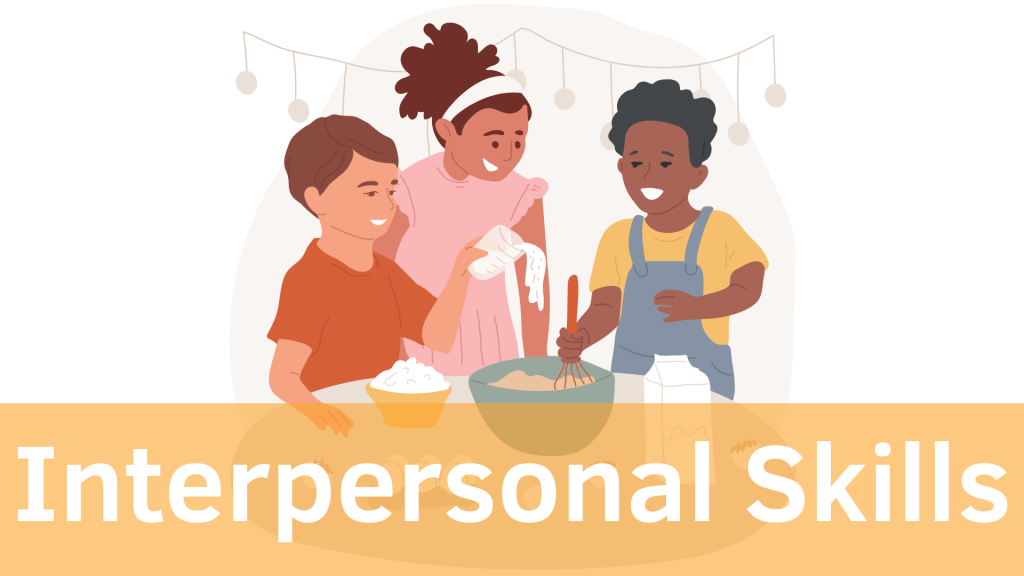Introduction
Interpersonal skills, also known as social skills, are essential for effective communication and meaningful interactions with others. These skills play a vital role in personal and professional success, making them a valuable asset for children to develop from an early age. By cultivating strong interpersonal skills, parents can equip their children with the tools to navigate social situations, build relationships, and thrive in various aspects of life. In this article, we will explore the significance of interpersonal skills, discuss key skills within this domain, and provide practical strategies for parents to foster their children’s interpersonal development.
Understanding Interpersonal Skills
Interpersonal skills encompass a range of abilities that enable individuals to interact effectively with others. These skills contribute to successful communication, collaboration, conflict resolution, and decision-making. By honing these skills, children can enhance their social awareness, emotional intelligence, and overall capacity to build positive relationships throughout their lives.
Key Interpersonal Skills
- Communication Skills: Effective communication lies at the heart of interpersonal interactions. Teaching children to express their thoughts and feelings clearly, listen actively, and engage in meaningful conversations enables them to connect with others authentically.
- Emotional Intelligence: Emotional intelligence involves recognizing and understanding one’s emotions and those of others. By nurturing empathy, self-awareness, and emotional regulation in children, parents can foster their ability to navigate emotions and develop meaningful connections with others.
- Team Working Skills: Collaboration and teamwork are essential for success in various contexts, including school, extracurricular activities, and future workplaces. Instilling the value of cooperation, compromise, and shared responsibility prepares children to work effectively in teams and appreciate diverse perspectives.
- Negotiation, Persuasion, and Influencing Skills: These skills empower children to express their needs and opinions assertively while considering the viewpoints of others. By teaching children to negotiate, persuade, and influence ethically, parents equip them with valuable tools for effective communication and conflict resolution.
- Conflict Resolution Skills: Conflict is a natural part of human interactions. Teaching children constructive conflict resolution strategies, such as active listening, compromise, and finding win-win solutions, empowers them to handle disagreements in a respectful and constructive manner.
- Problem-Solving Skills: Cultivating problem-solving skills equips children with the ability to identify challenges, analyze situations, brainstorm creative solutions, and implement effective problem-solving strategies. These skills enhance their ability to navigate interpersonal challenges and contribute positively to their social environments.
- Decision-Making Skills: The ability to make informed decisions is crucial for personal and social development. By involving children in decision-making processes, parents provide them with opportunities to consider different perspectives, weigh consequences, and develop their decision-making skills.
Strategies for Developing Interpersonal Skills in Children
- Start at Home: Create a supportive and communicative environment where children feel comfortable expressing themselves. Encourage open dialogue, active listening, and respect for differing opinions. By modeling effective communication and empathy within the family, parents lay the foundation for their children’s interpersonal growth.
- Emphasize Non-Verbal Communication: Help children recognize the importance of non-verbal cues in conveying messages and understanding others. Encourage them to pay attention to facial expressions, body language, and tone of voice. Engage in activities that promote non-verbal expression, such as role-playing emotions or playing charades.
- Encourage Hobbies and Interests: Support your child’s hobbies and interests as avenues for social interaction. Engaging in shared activities and joining clubs or classes related to their interests exposes children to like-minded peers, facilitating connections and conversations based on shared passions.
- Foster Empathy: Teach children the value of empathy by encouraging active listening, perspective-taking, and understanding others’ feelings. Engage in discussions that promote empathy and encourage them to consider different viewpoints. This cultivates compassion and fosters an inclusive mindset.
- Cultivate Friendliness: Emphasize the importance of kindness and friendliness in social interactions. Encourage your child to greet others with a smile, use polite language, and maintain eye contact during conversations. Regularly discuss the importance of being welcoming and respectful towards others.
- Encourage Questioning: Promote curiosity and active engagement in conversations by encouraging your child to ask questions. This not only demonstrates interest in others but also fosters a sense of curiosity and a desire to learn more. Encourage them to ask open-ended questions that stimulate meaningful discussions.
- Lead by Example: Children learn by observing the behavior of those around them, particularly their parents. Model effective communication, active listening, and respectful interactions in your own relationships. Apologize when you make mistakes and emphasize the importance of treating others with kindness and understanding.
- Engage in Reading Activities: Reading books together provides an excellent opportunity to explore interpersonal dynamics, emotions, and relationships. Select books that depict diverse characters and address themes of friendship, empathy, and conflict resolution. Discuss the characters’ actions, emotions, and the consequences of their choices.
- Teach the Components of a Conversation: Break down the elements of a conversation for your child. Explain how conversations have a beginning, middle, and end. Teach them how to start conversations, maintain engagement, and conclude them politely. This understanding helps children navigate social interactions more effectively.
- Guide Appropriate Communication: Help children understand the importance of appropriate topics and contexts for conversation. Teach them to respect boundaries and recognize when certain subjects may not be suitable. Emphasize the significance of maintaining confidentiality and not discussing sensitive information about others without permission.
- Address Voice Levels: Teach children appropriate voice levels for different situations. Explain when it is appropriate to speak softly and when it is necessary to project their voice. By understanding the nuances of voice modulation, children can adapt their communication to fit various social settings.
- Encourage Active Listening: Active listening is a crucial component of effective interpersonal skills. Teach children to listen attentively, maintain eye contact, and provide verbal and non-verbal cues that demonstrate their engagement. Encourage them to summarize what they have heard to ensure understanding.
- Incorporate Communication Games: Engage children in interactive communication games to enhance their communication skills. Activities like storytelling, role-playing, or debate encourage children to express themselves, think critically, and engage in meaningful conversations while having fun.
- Develop Assertiveness: Support children in expressing their opinions, needs, and desires assertively. Encourage them to communicate clearly, express themselves confidently, and stand up for their rights while considering the feelings and perspectives of others. This builds their self-confidence and ability to navigate interpersonal situations effectively.
- Highlight Nonverbal Communication: Help children recognize the significance of nonverbal cues, such as facial expressions, gestures, and body language. Explain how these cues convey emotions and messages. Encourage them to be mindful of their own nonverbal communication and observe others’ nonverbal cues.
- Foster a Culture of Sharing: Teach children the importance of sharing, whether it be toys, ideas, or experiences. Encourage them to engage in cooperative play, take turns, and contribute to the well-being of others. Sharing cultivates empathy, cooperation, and a sense of community.
- Encourage Observation: Encourage children to observe and interpret verbal and nonverbal communication in various social settings. Discuss their observations, encouraging them to reflect on different communication styles and cultural nuances. This cultivates awareness and adaptability in their interpersonal interactions.
Conclusion
Nurturing strong interpersonal skills in children equips them with the tools to navigate social interactions, communicate effectively, and form meaningful relationships. By emphasizing key skills such as communication, empathy, conflict resolution, and teamwork, parents can guide their children towards becoming socially intelligent individuals. Through a supportive and communicative environment, modeling positive behavior, and providing practical experiences, parents can help their children develop the interpersonal skills necessary for success in their personal and professional lives. By investing in their children’s interpersonal growth, parents contribute to their overall well-being and long-term success.




